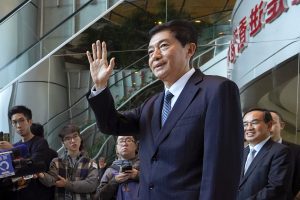The State Council, the government of the People’s Republic of China, has appointed a new director to head the Liaison Office of the Hong Kong Special Administrative Region (SAR). Luo Huining replaces Wang Zhimin, who was the director of the Liaison Office from September 2017. Wang was reportedly dismissed from his post. The leadership change comes after more than six months of widespread anti-Beijing protests and clashes in Hong Kong, as well as landslide victories for pro-democracy representatives in district council elections in November 2019. Reports emerged late last fall that the central government was considering replacing Wang as director; however, the Chinese Ministry of Foreign Affairs office in Hong Kong had called the report “false.”
The Hong Kong Liaison Office was established in 2000 and serves as the intermediary between Beijing and Hong Kong. According to the office’s website, it performs five main functions in the SAR: 1) link the Chinese Ministry of Foreign Affairs with the People’s Liberation Army garrison; 2) link and assist mainland authorities in managing Chinese-funded institutions; 3) promote exchange and cooperation in culture, economy, education, science, and sports between the mainland and Hong Kong, liaise with all types of residents in Hong Kong, and report the views of Hong Kongers about the mainland; 4) handle Taiwan-related matters; and 5) undertake other tasks assigned by Beijing. Macau, China’s other special administrative region, also has a Liaison Office. The two offices are outgrowths of former branches of the Xinhua News Agency in the respective territories.
Outgoing director Wang Zhimin worked in the Hong Kong branch of Xinhua in the 1990s. He later served in municipal positions in Fujian, a southeastern coastal province where current Chinese President Xi Jinping held various posts before rising to governor in the early 2000s. Prior to his position in Hong Kong, Wang headed the Macau liaison office from late 2012 to September 2017. His 27-month tenure as Hong Kong director is the shortest term in the role since the 1997 handover.
Wang previously made waves in April 2018, after a pro-democracy demonstration in Hong Kong. Wang said that locals should learn and respect the Chinese Constitution. “We can say that without our motherland, led by the Chinese Communist Party … there is no ‘one country, two systems,’” Wang said. He added “If you oppose this system, you are overturning our one country, two systems. This is a crime committed against Hong Kong people. It will not bring blessings to Hong Kong, but calamity.”
For his part, Luo, 65, was appointed vice chairman of the National People’s Congress Financial and Economic Affairs Committee at the end of 2019 and was believed to be phasing into semi-retirement. Unlike his predecessors, Luo enters the Liaison Office role with no prior Hong Kong experience. Instead, much of Luo’s experience comes from senior positions in both Chinese Communist Party (CCP) and government structures, including governor of Qinghai province in northwest China and secretary of the Shanxi Provincial Committee of the CCP.
The leadership change illustrates Beijing’s frustration and disagreement with Wang’s approach to the growing discontent toward the mainland among Hong Kongers, and particularly among younger generations. Given Luo’s background, it is likely that his appointment signals Beijing’s desire to more ardently exert itself over Hong Kong.
In his first public statement as liaison office director, Luo, speaking in Mandarin, said that “one country, two systems” is Hong Kong’s greatest advantage. And after months of tension, he said, “We all sincerely hope that the city will get back on the right track.”

































